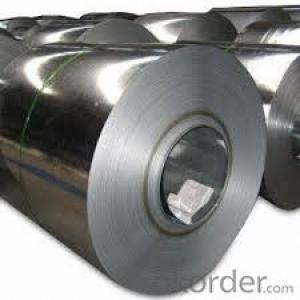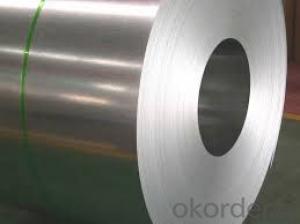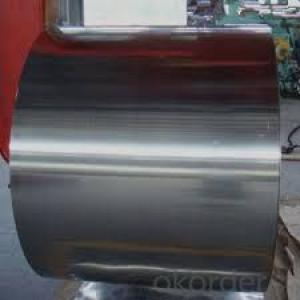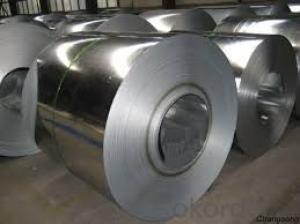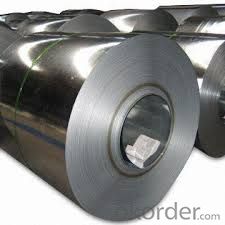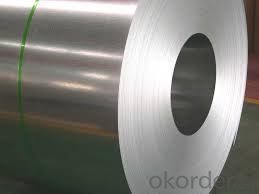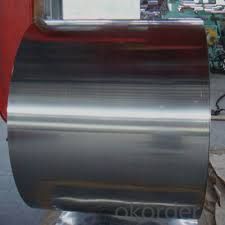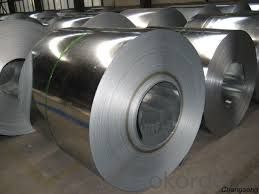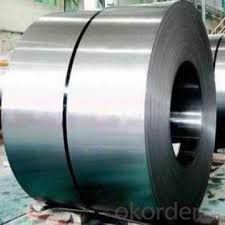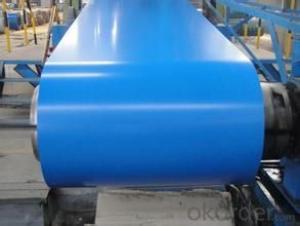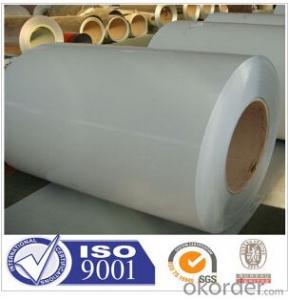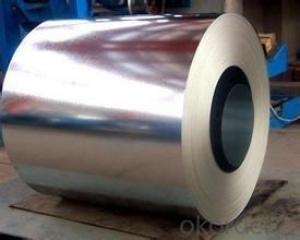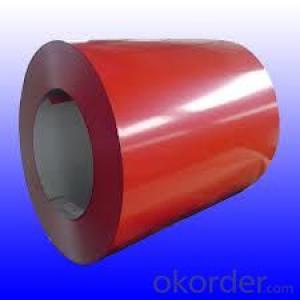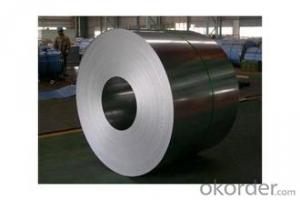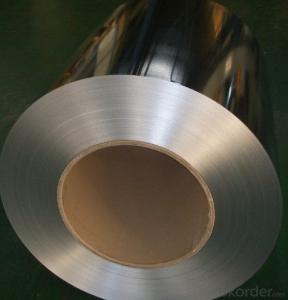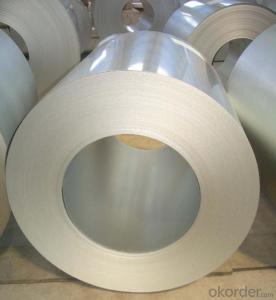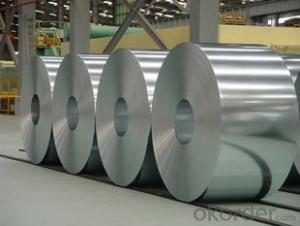Excellent Hot-Dip Galvanized/ Aluzinc Steel in Good Quality from china
- Loading Port:
- Tianjin
- Payment Terms:
- TT OR LC
- Min Order Qty:
- 100 m.t.
- Supply Capability:
- 5000000 m.t./month
OKorder Service Pledge
OKorder Financial Service
You Might Also Like
Hot-dip galvanized steel coils are available with a pure zinc coating through the hot-dip galvanizing process. It offers the economy, strength and formability of steel combined with the corrosion resistance of zinc. The hot-dip process is the process by which steel gets coated in layers of zinc to protect against rust. It is especially useful for countless outdoor and industrial applications.
Description:
1.Mateials:SGCC,DX51D / DX52D /S250,280GD
2.Size:width:600-1250mm(900mm,1215mm,1250mm,1000mm the most common)
thickness:0.15-2.0mm
length:1000-6000mm,as your require
3.Zinc coating :60-180g( as required)
4.Coil id:508mm
5.Coil weight: 3-5MT(as required)
6. Surface:regular/mini/zero spangle, chromated, skin pass, dry etc.
Applications of our Galvalume Coil:
Galvalume Coil widely used for roofing products, It is also the ideal base material for Prepainted Steel Coil.
1. roofing
2. gutters
3. unexposed automotive parts
4. appliances
5. furniture
6. outdoor cabinetry
- Q: What are the main characteristics of galvanized steel coils?
- The main characteristics of galvanized steel coils include high corrosion resistance, durability, and a shiny, metallic appearance. Galvanized steel coils are coated with a layer of zinc, which acts as a protective barrier against rust and other environmental factors. This coating also enhances the strength and longevity of the steel, making it suitable for various construction and manufacturing applications. Additionally, galvanized steel coils have excellent formability, allowing them to be easily shaped and fabricated into different products.
- Q: What are the different coil leveling line configurations used for steel coils?
- The steel industry utilizes various coil leveling line configurations to meet specific requirements and preferences. Some commonly employed configurations include: 1. Straightener: Employed to rectify coil shape defects or distortion. It consists of rollers that gradually straighten the coil. 2. Leveler: Ensures consistent thickness throughout the coil. Utilizes rollers to flatten the coil to the desired thickness. 3. Combination Straightener/Leveler: Integrates both straightening and leveling functions into a single machine. Combines rollers and straightening elements for shape correction and thickness leveling in one pass. 4. Looping Pit: Allows continuous processing of accumulated coils. Serves as a buffer between the entry and exit sections of the leveling line, accommodating variations in coil supply and demand. 5. Tension Leveler: Applies tension during leveling to remove shape defects and achieve a flat, uniform surface. 6. Rotary Shear: Incorporates a synchronized rotary shear to cut the leveled coil accurately and precisely. These examples showcase the diverse coil leveling line configurations used in the steel industry. The choice of configuration depends on factors such as desired product specifications, coil dimensions, processing speed requirements, and budget considerations.
- Q: What is the typical size and weight of a steel coil?
- The typical size and weight of a steel coil can vary depending on the specific application and industry. However, in general, steel coils are typically manufactured in widths ranging from 0.5 to 2 meters (1.6 to 6.6 feet) and can weigh anywhere between 1 to 25 metric tons (2,205 to 55,116 pounds). The exact size and weight of a steel coil will depend on factors such as the type of steel used, the intended use of the coil, and the manufacturing process employed.
- Q: What are the dimensions of steel coils used in the energy sector?
- The dimensions of steel coils used in the energy sector can vary depending on the specific application and requirements. However, commonly used dimensions for steel coils in the energy sector range from 0.5mm to 5.0mm in thickness, with widths typically ranging from 600mm to 2000mm. The diameter of the coil can vary as well, with commonly used sizes ranging from 1000mm to 2200mm. These dimensions are chosen to ensure the coils can be easily transported, processed, and utilized in various energy sector applications such as power plants, oil and gas pipelines, and renewable energy projects. It is important to note that these dimensions are not fixed and can be customized based on specific project requirements.
- Q: I know sterling silver can tarnish, so I was just wondering, how does stainless steel hold up?
- Does Stainless Steel Jewelry Tarnish
- Q: I have two guitars, a nylon stringed classical, and a steel stringed acoustic, I find the nylon strings easier to play, but doesn't have as good of sound as the steel stringed, and when I play with the steel strings, it really hurts my fingers, and if I play just a little bit, it feels like the high e string is going to cut my finger. Are the strings too high? What can I do to make the steel strings easier to play?
- If you want to end up playing acoustic steel string, continue learning on that one. Yes, it will hurt, but that's normal and your fingers will toughen up within a couple of weeks of playing (if you play on a regular basis). You will develop callouses. Also, go take your guitar to a shop to get a set up and they will fix the action if it's too high. (Too high action makes the guitar harder to play). When I started playing, at first my fingers *HURT*, but now they don't anymore, even the pinky. :D
- Q: How are steel coils used in the manufacturing of tubes?
- Steel coils are used in the manufacturing of tubes by being processed through a series of steps such as slitting, forming, and welding. These coils are slit into narrower strips, which are then formed into a cylindrical shape and welded together. This process allows for the efficient production of seamless or welded tubes, which can be used in various industries such as construction, automotive, and oil and gas.
- Q: How do steel coil manufacturers handle customer complaints?
- Steel coil manufacturers handle customer complaints by following a structured process to address and resolve the issues raised by customers. Firstly, when a customer complaint is received, it is important for the manufacturer to carefully listen and understand the nature of the complaint. This involves actively engaging with the customer to gather all relevant details and information regarding the issue. It is crucial to maintain clear communication and ensure the customer feels heard and valued. Once the complaint has been fully understood, the manufacturer should promptly investigate the situation. This may involve reviewing production records, analyzing quality control measures, or conducting internal inspections. The aim is to identify the root cause of the problem and determine if it was a result of a manufacturing defect, shipping mishap, or any other factor. After the investigation, the manufacturer should provide a timely response to the customer. This response should include an explanation of the findings, an acknowledgment of the customer's concerns, and a proposed solution or resolution. The proposed solution might involve replacing the defective coils, offering compensation, or providing expert advice on how to mitigate the issue. To prevent similar complaints in the future, the manufacturer should also take steps to rectify any internal shortcomings. This could involve revisiting quality control procedures, improving communication among departments, or implementing additional training for employees. Furthermore, steel coil manufacturers should strive to maintain an open and transparent line of communication with customers throughout the complaint handling process. This includes providing regular updates on the progress of the investigation and promptly addressing any further concerns or questions raised by the customer. Overall, the key to handling customer complaints in the steel coil manufacturing industry is to prioritize customer satisfaction and ensure a fair and efficient resolution. By following a structured approach, actively listening to customers, and taking appropriate corrective actions, manufacturers can effectively address customer complaints and maintain positive relationships with their clients.
- Q: How are steel coils used in the manufacturing of defense equipment?
- Steel coils are used in the manufacturing of defense equipment as they provide the necessary strength, durability, and flexibility required for various applications. These coils are often processed and shaped into components such as armor plates, vehicle frames, ammunition casings, and other structural parts. The high tensile strength and resistance to impact and deformation make steel coils an ideal material for protecting military personnel and assets, ensuring the reliability and effectiveness of defense equipment.
- Q: can you play one?
- Well, my digital piano has a Steel Guitar setting that makes it kind of sound like one, but other than that I know nothing about them.
Send your message to us
Excellent Hot-Dip Galvanized/ Aluzinc Steel in Good Quality from china
- Loading Port:
- Tianjin
- Payment Terms:
- TT OR LC
- Min Order Qty:
- 100 m.t.
- Supply Capability:
- 5000000 m.t./month
OKorder Service Pledge
OKorder Financial Service
Similar products
Hot products
Hot Searches
Related keywords
